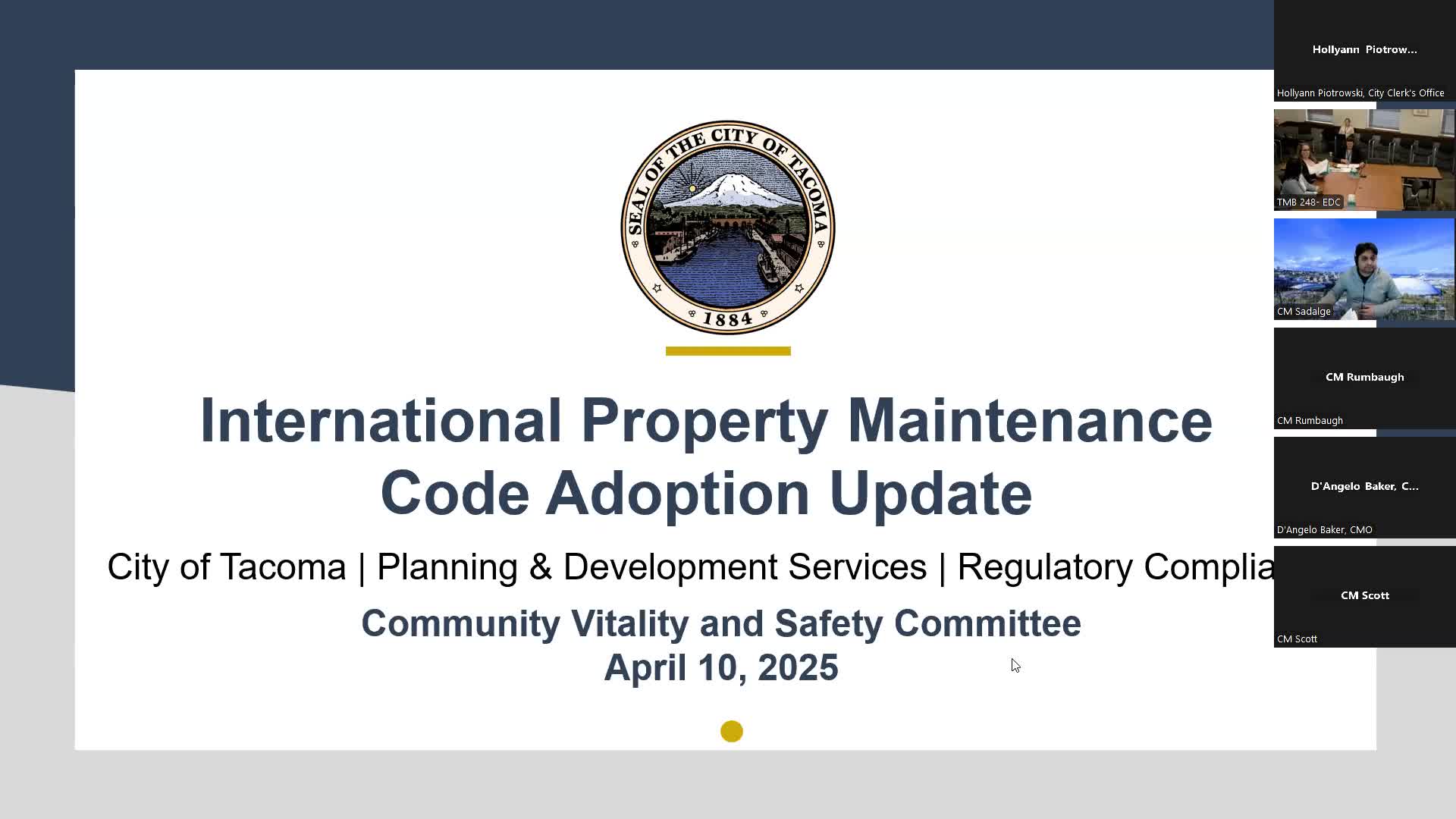Tacoma committee advances plan to adopt International Property Maintenance Code after staff briefing
Get AI-powered insights, summaries, and transcripts
Subscribe
Summary
Planning and Development Services briefed the Community Vitality and Safety Committee on a plan to replace Tacoma Municipal Code nuisance and minimum building codes with a customized International Property Maintenance Code (IPMC), targeting adoption in April 2026 and enforcement July 1, 2026, with a six-month implementation review planned.
Tacoma’s Community Vitality and Safety Committee heard an update April 10 from Planning and Development Services on a proposal to consolidate the city’s private-property nuisance and minimum building codes into a single International Property Maintenance Code (IPMC) tailored to local needs.
The move would consolidate disparate Tacoma Municipal Code sections — including nuisance provisions in TMC 8.3 and exterior building standards in TMC 2.01 — into one enforceable code, officials said, and is intended to create clearer timelines, single-case records in the city’s compliance software and more predictable enforcement for property owners and staff.
Mindy Weber, code inspection manager for Planning and Development Services, told the committee, “We’re now positioned to move forward with a unified approach that addresses multiple code sections simultaneously.” Deja Irving, code compliance supervisor, said, “The International Property Maintenance Code is, like I just stated, a total property maintenance code that combines all aspects of our existing Nuisance 8.3 and Building 2.01 into a clear, concise, easily interpretable, and enforceable addition to the Tacoma municipal codes.”
Why it matters
Staff said consolidating to the IPMC would let inspectors manage a single case record per property instead of multiple concurrent cases across different TMC sections, allow Acela (Accela) configuration for consistent workflows and provide standardized criteria to speed emergency assessments and post-event coordination. The IPMC is maintained and updated by the International Code Council (ICC), which staff cited as a benefit for staying current with best practices.
Details from the briefing
- Scope: Planning and Development Services proposes the IPMC be the primary private-property maintenance code for Tacoma, folding in existing nuisance (TMC 8.3), minimum building and structures (TMC 2.01) and other private-property enforcement areas such as noise (TMC 8.122) and certain health and sanitation items where appropriate.
- Operations: Staff described configuring Accela to hold single comprehensive case records, streamlined notice and timeline processes (for example, one notice of violation per property), and centralized reporting tools to identify problem properties and measure compliance improvements.
- Stakeholder engagement: Staff said they have already consulted widely during the nuisance-code review, including more than 30 neighborhood meetings, meetings with property owners and neighbors, internal departments (legal, Tacoma Police Department, fire, HEAL Team), business groups and a WAIS (Washington Association of Code Enforcement) forum attended by about 120 enforcement officers from across Washington state. Common concerns raised to staff include repeat offenders, graffiti, ineffective penalties, long abatement timelines, boarded buildings, absentee owners and encampments.
- Policy options: The IPMC framework would be customized locally. Staff listed potential local adjustments under consideration: differentiated enforcement for commercial versus residential properties, specific protocols for private-property encampments, sliding-scale penalties by violation severity or property context, progressive enforcement for repeat offenders and cost-recovery methods for repeated abatements.
- Timeline: Staff presented a project timeline that begins immediately with a three-month period to gather Council input on policy priorities; a four- to eight-month period for detailed code writing and local amendments; formal Council adoption in months nine through 12; a 90-day education period; and enforcement beginning July 1, 2026. A six-month post-implementation review would begin in January 2027.
Council questions and staff responses
Several council members urged early Council engagement and study-session briefings so the full Council can weigh policy choices before draft code language is finalized. “This is such a big change,” said Council Member Rumba. Council Member Sidalgo said she “100% agree[s]” that the item should reach study session and praised the staff’s organization of policy choices for Council discussion.
On 3-1-1 integration, staff said Planning and Development Services is already working with the customer service center to refine complaint categories and expects an update in May. On abatement speed, staff said they are working with Legal to review what changes are permissible and acknowledged abatement timelines are a top priority but that specific statutory or procedural changes must be drafted and legally vetted.
Staff also said adopting IPMC could help recruiting and retention because many other jurisdictions use the code and inspection staff may bring relevant experience. Weber noted some near-term operational improvements are expected from the departmental reorganization that merged permit compliance and code compliance teams and from configuring Accela in advance of full IPMC adoption.
Formal actions taken
The committee received the presentation and discussed policy considerations; no vote to adopt the IPMC was taken. The meeting did include two procedural votes: the committee voted to appoint Council Member Walker as presiding officer for the April 10 meeting, and it later voted to adjourn. Both motions were approved by voice vote.
Next steps
Staff asked for recurring check-ins with the committee as they draft local amendments and perform stakeholder outreach. The committee scheduled future meetings to continue related work on rental housing and sheltering codes.
For more detail
Staff said the draft code language, fee schedule proposals and proposed local amendments will be developed during the code-writing phase and returned to Council for review and formal adoption processes later in the timeline. No specific fee amounts or final penalty schedules were presented at the April 10 briefing.
